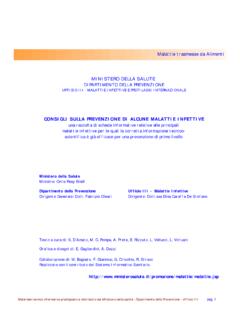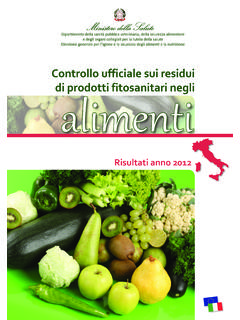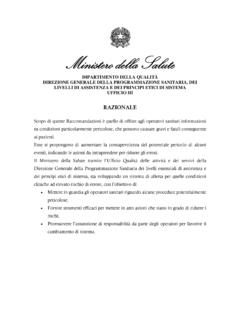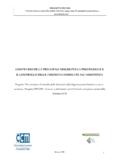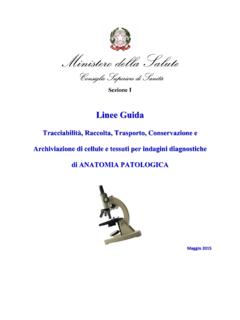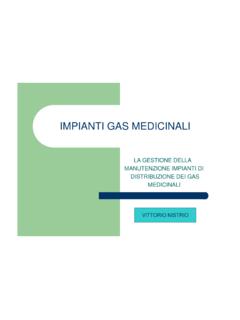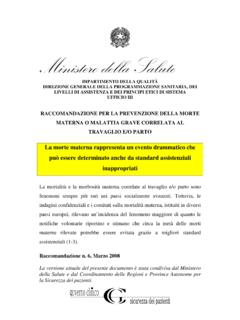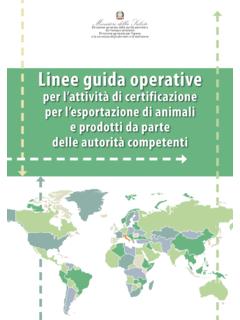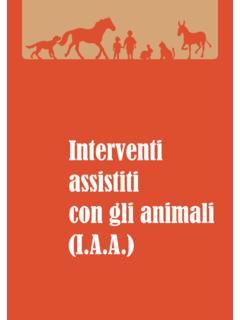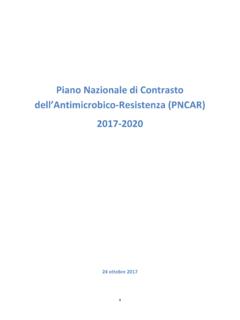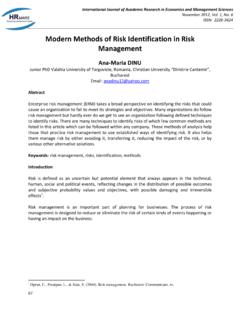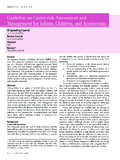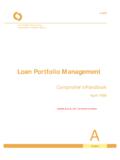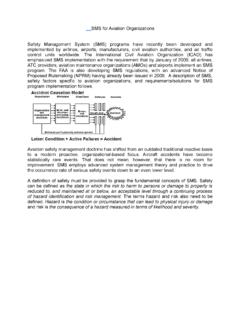Transcription of Risk Assessment - Invitation Letter and CAs info
1 1 / 100 1 / 100 Invitation Letter Training Courses on principles and methods of food safety risk Assessment THIS TRAINING IS IMPLEMENTED BY THE TRAINSAFERFOOD CONSORTIUM. 2 / 100 2 / 100 Table of Contents Introduction .. 1 1. Selection criteria .. 2 2. Training sites .. 3 3. Timing .. 7 4. Invitation of your Country .. 11 5. Registration Procedure .. Errore. Il segnalibro non definito. 6. Learning objectives and agendas .. 11 1 Introduction Dear National Contact Point, As part of the Better Training for Safer Food initiative, the Consumers, Health and Food Executive Agency is organizing and implementing a 24 month training programme of activities on principles and methods of food safety risk Assessment mainly to be held for officials from EU Member States (MS), and Candidate Countries (CC) under the 'Better Training for Safer Food' Initiative. The overall objective of the course is to train experts with a scientific background and an interest in food and/or feed safety risk Assessment in order to expand their theoretical knowledge and practical skills on principles and methods of risk Assessment .
2 The EFSA Advisory Forum has, on several occasions, recommended that EFSA should develop a training program that can increase the understanding of procedures of risk Assessment and contribute to an increased harmonization of risk assessments. The training courses will primarily train staff of competent authorities involved in food safety activities at national level in MS and keep them up-to-date with all relevant aspects of EU legislation in order to facilitate a more uniform and harmonized practice for risk Assessment . The overall objective of the 8 courses is to train professionals with a scientific background and an interest in food-safety risk Assessment in the principles, concepts and methods of risk analysis and to provide them with theoretical knowledge and practical experience in developing microbiological risk Assessment models. The practical experience will be gained through the use of real-life case studies ( from published EFSA opinions or national studies) that the participants will work on throughout the course and in parallel with new topics being added to their theoretical knowledge base.
3 The complexity level of the courses will be adapted to the participants experience in risk Assessment , which will be accessed beforehand. 2 1. Selection criteria The trainees have the required technical and linguistic knowledge level. It should be clear from their background and professional skills that the participation in the training activity will be a key element for the improvement of their daily work. Participants shall represent staff of competent authorities of the Member States involved in official control activities and in general experts involved in food safety risk Assessment . It should be clear from their background and professional skills that the participation in the training activity will be a key element for the improvement of their daily work. The participants will be requested to commit themselves to disseminate the knowledge received via different dissemination methods informing colleagues about the information received at the training, distributing (photocopying or sending via electronic way) the training materials among their colleagues, preparing informative articles in the professional national or, if possible, in international journals, preparing presentations based on the training materials for the obligatory national Competent authorities professional trainings or other disseminating methods which could be appropriate to share the information received via the BTSF trainings.
4 3 2. Training sites 7 courses will be held in Lisbon (Portugal), 5 courses will be held in Berlin (Germany) and 4 courses will be held in Tallinn (Estonia). Tallinn In Tallinn we have selected Clarion Hotel Euroopa for the accommodation, meals and training venue. Clarion Hotel Europa is situated in immediate proximity of the Port of Tallinn, 1km from the old town. It is a top class business hotel that is characterized by its international ambiance. It is closely associated with art, music, design and culinary art. The hotel offers multifunctional meeting rooms of different sizes, suitable for conferences and seminars. The conference center is equipped with modern video, sound and presentation technology and also free Wi-Fi. Participants will be assisted by GIZ event managers but also by the highly trained and experienced staff during the entire event. 4 Lisbon In Lisbon we have selected Novotel Lisbon for the for the accommodation, meals and training venue.
5 The hotel is located in the city of Lisbon, just 10 minutes walk from Lisbon s historical city center. Totally renovated, it is ideal for business meetings, offering 10 spacious meeting rooms. The Novotel Lisbon hotel also has a swimming pool, fitness center, restaurant, bar and garage. All rooms are modern, spacious and equipped with: shower, WC, hairdryer, telephone, cable TV, mini bar, Wi-Fi connection. The conference room selected is a first-class, fully air-conditioned event room, featuring modern conference technology, including projector, laptop (connected to Internet), flipchart, whiteboard, laser pointer and free WLAN for the participants. 5 Berlin In Berlin we have selected the NH Alexanderplatz. It is located in the city center and participants have easy access to all of the sights and attractions of Berlin. Alexanderplatz hosts Berlin s famous television tower and the shopping of Alexa. And nearby, the beautiful urban oasis Volkspark Friedrichshain with green paths tempts joggers and sightseers.
6 The conference facilities at the NH Berlin Alexanderplatz provide a sophisticated space for this type of event. For refreshments, lunches and dinners, there is a very nice and airy restaurant with its elegant summer terrace. Rooms are modern and fully equipped. The NH Berlin Alexanderplatz hotel has also a nice wellness area including a sauna and steam bath. 6 Rome In Rome we have selected the IBIS in district for the accommodation and dinners. The Hotel Opening was on July 2010, with the project of the prestigious international architecture GPAIA study of Toronto. The district is a very nice and historical district of Rome that offers a very interesting structure with its play of lines, colors and shapes. Several museums and attractions are also present. The interiors are modern and stylish, made with steel and wood. It is an ideal hotel for business travelers and attendees of trade expositions and congresses All rooms extremely colorful and equipped with: shower, WC, hairdryer, telephone, cable TV, mini bar, Wifi.
7 Hotel OP has an on-site restaurant serving national specialities and international dishes. 7 3. Timing Session Reference Dates Location Dateline for applications Risk Assessment Session 1 Chemical - Risk Assessment 10-14 Nov 2014 Lisbon 30 Sept 2014 Session 2 Pest Risk Assessment 12-16 Jan 2015 Lisbon 03 Oct 2014 Session 3 Nutrition Risk Assessment 02-06 Feb 2015 Lisbon 03 Oct 2014 Session 4 GMO Risk Assessment 23-27 Feb 2015 Lisbon 15 Oct 2014 Session 5 MC - Risk Assessment 02-06 Mar 2015 Berlin 15 Oct 2014 Session 6 Environmental Risk Assessment 16-20 Mar 2015 Rome 15 Oct 2014 8 Session 7 Animal Health Risk Assessment 20-24 Apr 2015 Berlin 15 Nov 2014 9 Session 8 MC - Risk Assessment 04-08 May 2015 Tallinn 15 Nov 2014 Session 9 Animal Welfare Risk Assessment 18-22 May 2015 Tallinn 16 Jan 2015 Session 10 Pest Risk Assessment 15-19 Jun 2015 Tallinn 16 Jan 2015 Session 11 Chemical - Risk Assessment 29 Jun 03 Jul Berlin 30 Jan 2015 Session 12 Nutrition Risk Assessment 14 18 Sep 2015 Berlin 07 March 2015 Session 13 GMO
8 Risk Assessment 05-09 Oct 2015 Tallinn 07 March 2015 Session 14 Animal Walfare Risk Assessment 11-15 Jan 2016 Lisbon 04 May 2015 10 Session 15 Animal Health Risk Assessment 08-12 Feb 2016 Lisbon 04 May 2015 Session 16 Environmental Risk Assessment 22-26 Feb 2016 Tallinn 04 May 2015 11 4. Invitation of your Country The Chafea wishes to invite participants from your country to attend sessions as indicated in the table received in the Annex quota. However, do not hesitate to send us additional applications, which would be placed on a reserve list for each session. Should there be any availability, we would inform the National Contact Point at least three weeks before the training session. As much as possible, do not hesitate to send us registration forms before the indicated deadline. The earlier participants are registered, the easier it is then to carry out the organisation of the session 5. Learning objectives and agendas Training Course 1: Microbiological risk Assessment The training course will cover the three components of risk analysis risk Assessment , risk management and risk communication but will give particular focus to risk Assessment under the context of microbial food safety.
9 The aim is to introduce the participants to the concept of quantitative microbiological risk Assessment as applied in national and international food safety. Participants will learn how to perform a structured risk Assessment in alignment with the food safety question they have to address. Efforts will be put on stressing the benefits and strengths of quantitative modelling, taking into account the uncertainty in our knowledge and the variability in the key parameters applied in a risk Assessment mode ( prevalence and number of pathogens present in the food in question). Based on this, the participants should be able to perform robust interpretations of risk estimates from risk Assessment models. At the end of the course, participants will: Be familiar with the concepts of risk analysis risk Assessment , risk management and risk communication; Be familiar with the legal framework and the role of international regulatory agencies in food-safety risk Assessment ; 12 Understand and be able to describe the four steps of food-safety risk Assessment hazard identification, hazard characterization, exposure Assessment and risk characterization; Know the key differences between risk Assessment approaches and risk terminology used in the various areas of food-safety risk Assessment ( chemical vs.)
10 Microbial risk Assessment ) 13 Be able to identify food safety problems and frame appropriate risk questions; Be able to construct exposure pathways; Be able to identify and interpret the data typically required in microbiological risk Assessment ; Be able to describe the types of models used in risk Assessment ( farm-to-consumption and process models), their utility, data requirements and differences between models; Be able to develop qualitative and (simple) quantitative risk Assessment models (deterministic and stochastic) and construct different scenario analyses; Be able to apply relevant features in the most common software used in quantitative microbial risk assessments (primarily @RISK); Be able to interpret risk estimates and run different scenario analyses, taking into account variability and uncertainty; Be able to assess the model fit and perform sensitivity analyses; Have a basic understanding of the importance of appropriate communication of risk Assessment results and risk management decisions.
